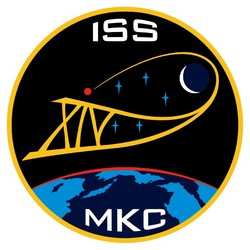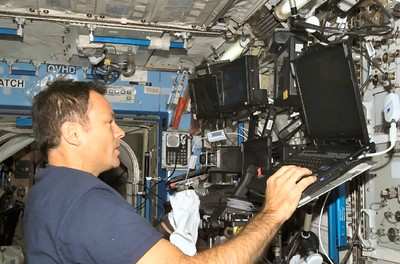ISS Status Report #43, 3 p.m. CDT – Friday, Oct. 6,
2006
 Expedition 14 completed its first
full week solo on the International Space Station performing
standard early mission checks and drills plus some equipment
troubleshooting.
Expedition 14 completed its first
full week solo on the International Space Station performing
standard early mission checks and drills plus some equipment
troubleshooting.
Expedition 14 Commander Michael Lopez-Alegria and Flight
Engineer Mikhail Tyurin have been aboard the station for 19 days,
while Flight Engineer Thomas Reiter of the European Space Agency is
in his third month in orbit. Along with other work, the crew
members prepared this week for a short trip away from the station
next week, when they will fly the Soyuz spacecraft from one docking
port to another.
Early in the week, the crew conducted a check of procedures
required to exit the station in an emergency, ensuring all
necessary equipment is in place. Throughout the week, time was set
aside for Lopez-Alegria and Tyurin to familiarize themselves with
the station and its operations. They started several new scientific
activities and medical checks.
Lopez-Alegria began his first session with the nutrition
experiment. He collected blood and urine samples and began logging
all of his food and drinks consumed. The experiment, which tracks
many vitamins and minerals essential for good health, is the most
comprehensive in-flight study to date of human physiological
changes during long-duration spaceflight. The information will help
define nutritional requirements and food systems for future
missions to the moon and Mars.

Lopez-Alegria also supported the Passive Observatories for
Experimental Microbial Systems in Micro-G, or POEMS experiment, by
storing the next set of samples into the Minus-Eighty Laboratory
Freezer for ISS, or MELFI. MELFI is a cold storage unit that
maintains experiment samples at temperatures of minus 80 degrees
Celsius, minus 26 degrees Celsius or 4 degrees Celsius throughout a
mission. POEMS will evaluate the effect of stress in the space
environment on the generation of genetic variation in model
microbial cells. NASA’s payload operations team at the
Marshall Space Flight Center, Huntsville, Ala., coordinates U.S.
science activities on the station.
On Friday, all crew members performed a normal periodic fitness
evaluation, exercising on a stationary bicycle aboard the station
and measuring heart rate and blood pressure. One new scientific
investigation began with Reiter as part of his evaluation. An
oxygen uptake monitor provided by the European Space Agency was
used to measure Reiter's oxygen consumption, a key parameter that
can be used to measure fitness. The fitness evaluations are
conducted once a month. Lopez-Alegria and Tyurin also checked
emergency medical equipment and supplies, a check done early in
each crew's flight.
Tyurin spent time mid-week continuing to troubleshoot the Russian
Elektron oxygen-generation system. The system converts water into
oxygen to replenish the cabin air. It has not been functional since
it overheated just before Expedition 14 arrived. The crew replaced
components in an Elektron control panel this week, but problems
with its operation persisted. Russian engineers are evaluating the
system and further repairs may wait until the next supply ship
arrives with additional parts. The next Progress cargo craft is set
to launch later this month. Plentiful oxygen supplies are available
on the station. Oxygen is now being replenished in the cabin from
tanks located on the Quest airlock.

U.S. flight controllers are evaluating a vibration seen in one
of the station's Control Moment Gyroscopes (CMGs) this week. The
electrically powered CMGs maintain the station's orientation so
that thrusters and limited fuel do not need to be used for that
purpose. The vibrations were first observed Sept. 28 as a station
maneuver was performed using thrusters. The gyroscope, CMG-3, was
taken offline to allow additional testing. Since then, controllers
have run various tests with CMG-3 to better characterize the
intermittent vibrations, and engineers have determined it could be
put back online and in normal operation, if needed. Only three CMGs
are necessary to properly maintain the station's orientation.
The station crew members will board the Soyuz spacecraft docked
at the rear of the Zvezda living quarters module on Tuesday to
prepare for the short move. NASA Television will cover the activity
live beginning at 1:45 p.m. CDT. With Soyuz Commander Tyurin at the
controls, they will undock from the Zvezda port at 2:14 p.m. and
redock to the Earth-facing Zarya module port at 2:39 p.m. CDT.
 ANN's Daily Aero-Term (04.25.24): Airport Rotating Beacon
ANN's Daily Aero-Term (04.25.24): Airport Rotating Beacon ANN's Daily Aero-Linx (04.25.24)
ANN's Daily Aero-Linx (04.25.24) Klyde Morris (04.22.24)
Klyde Morris (04.22.24) Airborne 04.24.24: INTEGRAL E, Elixir USA, M700 RVSM
Airborne 04.24.24: INTEGRAL E, Elixir USA, M700 RVSM Airborne 04.22.24: Rotor X Worsens, Airport Fees 4 FNB?, USMC Drone Pilot
Airborne 04.22.24: Rotor X Worsens, Airport Fees 4 FNB?, USMC Drone Pilot





